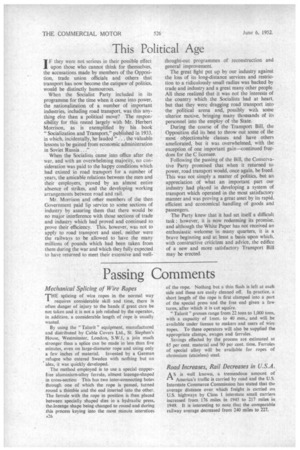This Political Age
Page 28

If you've noticed an error in this article please click here to report it so we can fix it.
▪ F they were not serious in their possible effect ▪ upon those who cannot think for themselves, the accusations made by members of the Opposition, trade union officials and others that transport has now become the catspaw of politics, would be distinctly humourous.
When the Socialist Party included in its programme for the time when it came into power, the nationalization of a number of important industries, including road transport, was this anything else than a political move? The responsibility for this rested largely with Mr. Herbert Morrison, as is exemplified by his book "Socialization and Transport," published in 1933. in which, incidentally, he lauded ... the valuable lessons to be gained from economic administration in Soviet Russia ..."
When the Socialists came into office after the war, and with an overwhelming majority, no consideration was paid to the happy conditions which had existed in road transport for a number of years, the amicable relations between the men and their employers, proved by an almost entire absence of strikes, and the developing working arrangements between road and rail.
Mr. Morrison and other members of the then Government paid lip service to some sections of industry by assuring them that there would be no major interference with those sections of trade and industry which had proved and continued to prove their efficiency. This, however, was not to apply to road transport and steel, neither were the railways to be allowed to have the many millions of pounds which had been taken from them during the war and which they fully expected to have returned to meet their extensive and well thought-out programmes of reconstruction and general improvement.
The great fight put up by our industry against the loss of its long-distance services and restriction to a ridiculously small radius was backed by trade and industry and a great many other people. All these realized that it was not the interests of the country which the Socialists had at heart, but that they were dragging road transport into the political arena and, possibly with some ulterior motive, bringing many thousands of its personnel into the employ of the State.
During the course of the Transport Bill, the Opposition did its best to throw out some of the most objectionable clauses and have others ameliorated, but it was overwhelmed, with the exception of one important gain—continued freedom for the C licensee.
Following the passing of the Bill, the Conservative Party promised that when it returned to power, road transport would, once again, be freed. This was not simply a matter of politics, but an appreciation of what an important part our industry had played in developing a system of transport which operated in the most satisfactory manner and was proving a great asset by its rapid, efficient and economical handling of goods and passengers.
The Party knew that it had set itself a difficult task ; however, it is now redeeming its promise, and although the White Paper has not received an enthusiastic welcome in many quarters, it is a brave beginning and at least a basis upon which, with constructive criticizm and advice, the edifice of a new and more satisfactory Transport Bill may be erected.
































































































